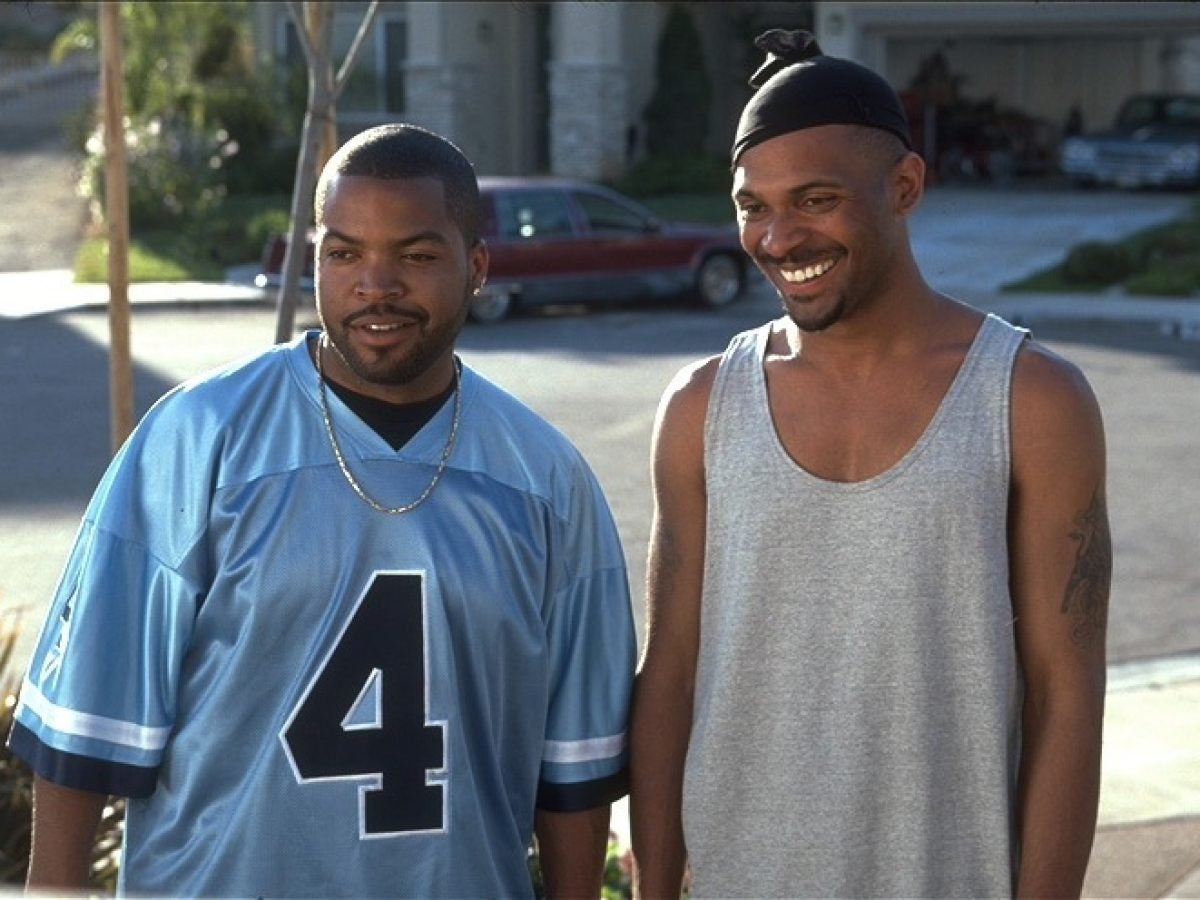
You may not have known the scene, but you may know the feeling. Ice Cube’s “Craig,” struts through a cluttered, distinctly ‘90s music shop—mostly pink, stocked with plenty of vinyl. Just behind him, the erratic energy of Pinky, played by Clifton Powell, engulfs the room. With a gun in hand, and a bubblegum-rose suit, he delivers the line: “Say another motherf***ing word!”
In comes the laughter—deep, unrestrained, contagious. It spills through theater aisles and pews, so transferable that you forget what the outside world sounded like without it. This rare effect fosters both familiarity and community. Such is the absence of comedy films like Next Friday some 25 years after its theatrical debut: all that public mirth revealed so little about Black folks during that time, but when we laughed, joy found company with more joy.
The film tracked Craig’s move to the suburbs to escape vengeful hood demon Deebo, serving as an example of how Black comedies on the big screen became snapshots of a time—with all their vernacular, bawdy cartoonish carnality, neck rolls, and flamboyant Blackness. Each watch went down like comfort food, but this wasn’t the sort of nourishment of pristine cinema but something else entirely: a world decentered from white cultural norms or sensibilities. A night of laughing at our most unruly, ludicrous selves.
Consider the moments: The ’80s was the decade of Eddie Murphy in Beverly Hills Cop, who shared space with Robert Townsend’s scathing, self-aware industry satire Hollywood Shuffle, and the Wayans family’s Blaxploitation riff I’m Gonna Git You Sucka. By the early ’90s, it was House Party, where Kid ’n Play turned Black teenage rebellion into a cultural movement, and the Friday before Next Friday in ‘95, when Cube and Chris Tucker redefined a single day in the hood with hilarity and personality.
This juxtaposition of goofiness, spontaneity, and jokes offered by Black humor stood as an alternative to the reality of America itself, a nation grappling with racial uprisings catalyzed by the Rodney King verdict in 1992. To truly account for the importance of these big-screen comedic refuges, you have to consider them inseparable from these decades of relentless policing and systemic inequalities taking place on the outside.
Boomerang exemplified this power, blending humor with a sophisticated portrayal of Black professionals navigating love and ambition. Prior to that, 1989’s Do the Right Thing combined sharp banter and comedic moments with a sobering lens on inequality. These films created spaces where emotional relief could thrive, even amid the nuances of Black life.
Make no mistake, some of the tropes of this passing era aged like week-old milk—especially the lazy, reductive stereotypes of LGBTQ+ individuals or one-note portrayals of Black men, women, and other marginalized groups. Coming to America, for instance, while celebrated for presenting Africans with majesty, leaned hard into ignorance through caricatured portrayals of African traditions, framing them as exotic or absurd for comedic effect. Still, these films brought to the world a set of characters so charming and tactile that they felt—and still feel, within the Black spectated space of a theater—like imperfect Edens.
By the early 2000s, films like Barbershop and White Chicks were still released, but by the late 2010s, movies like Girls Trip felt endangered. Directed by Malcolm D. Lee, the raunchy comedy celebrated Black sisterhood with humor and heart, turning a modest $19 million budget into a $140 million global hit, proving Black comedies still had box-office punch.
From then to now, this experience is largely gone, and we’ve had to make do with the surrogate, decoy, and stand-in: streaming services now have a chokehold on everything, including Black comedies. The current system is no longer designed to manufacture anything but the blockbuster. Studios want returns and focus-tested number ones. Universal Pictures, which took a chance on distributing Girls Trip yesterday, would rather bet on the Oscar-nominated Wicked today.
You could easily see the genre’s theatrical slow demise as an inevitable casualty of Hollywood’s profit machine—a system in which content catering to Black audiences is often the first to suffer or face the most cynicism. The biggest names in Black comedy films of course adapted to the times. Eddie Murphy’s Coming 2 America bypassed theaters entirely, going straight to Prime Video. Bad Trip, starring Eric André, found a home on Netflix, while the comedy-horror The Blackening enjoyed streaming success after a modest theatrical run.
It’s a loss of experience that’s difficult to overlook in 2025, when—amid a rollback of diversity, equity and an emboldened tide of regressive attitudes toward race and representation—the physical spaces for Black folks to find safety in are all but disappearing. It’s where some of us are right now: a bit hopeless, skeptical, and in the mood for a specific kind of laugh, like the previous ebb in the ’80s and ’90s.
With Next Friday celebrating its 25th anniversary last month, the flick’s legacy reminds us of what once was. These films weren’t just entertainment—they were spaces of joy and cultural affirmation. Although the Keke Palmer and SZA-led One Of Them Days became a hit, theaters still may no longer embrace Black comedies the way they once did, but the need for shared laughter and connection must find its way elsewhere, as it always has.
If the theatrical experience that Black Panther provided to Black audiences in 2018 was a reminder of the power of communal watching, then the loss of that shared joy—mainly the sound of other Black folks laughing together—is a loss that now feels immeasurable. Power and oppression aspire to subjugate hope, and one cannot withstand them alone. Black folks must find ways to hear each other laugh again.
